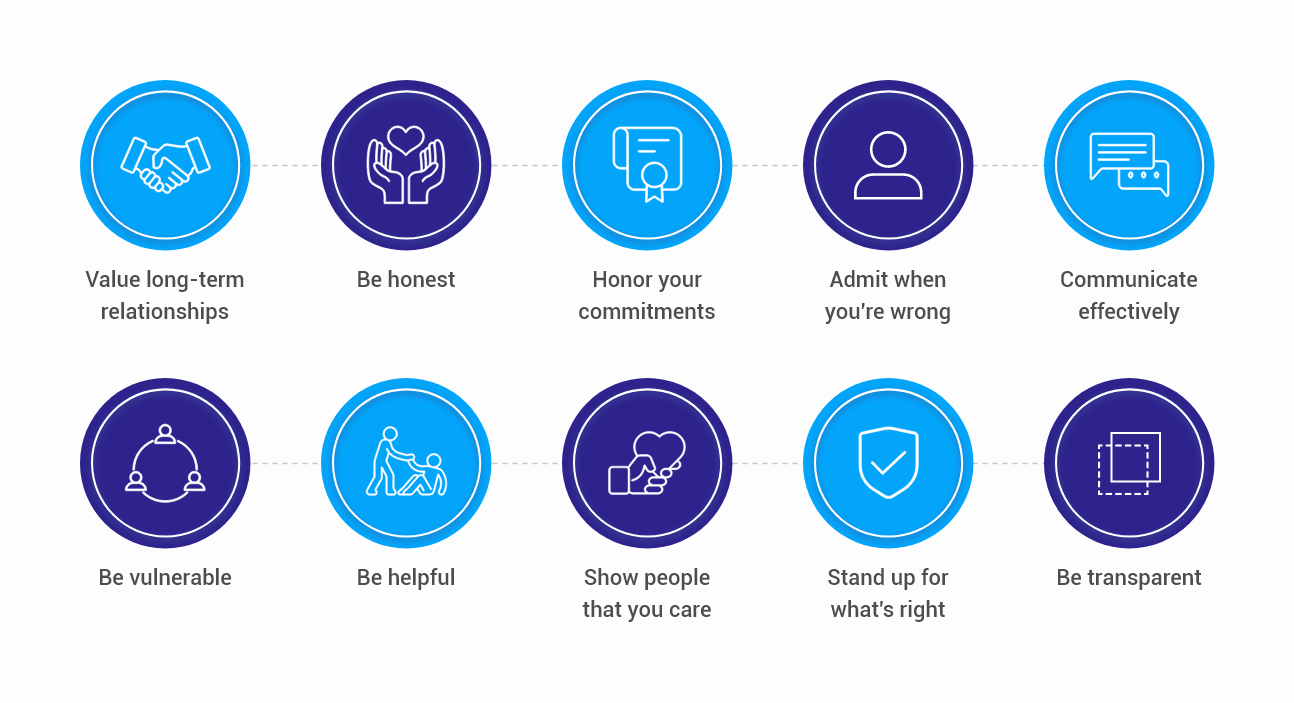Employee engagement is a key factor that influences productivity, retention, customer satisfaction, and overall business performance. That’s why employee engagement training is important.
Here’s a list of the top 10 employee engagement training courses and programs you can use.
List of Employee Engagement Training Courses
I came up with these employee engagement training topics based on my experience, other trainers’ reviews, and recommendations on top listing sites.
1. Building Trust With Your Team
Trust is the foundation of a cohesive and successful team. When employees trust their leaders, they are more likely to be engaged, productive, and innovative. This employee engagement training program will teach you how to build trust with your team through authenticity, logic, and empathy.

The course includes worksheets and assessment quizzes to evaluate knowledge retention and ensure effective learning outcomes. By enrolling in this course, you can reap tangible benefits such as enhanced employee engagement and performance, improved collaboration and communication, reduced conflict and turnover, and a more positive and productive work environment.
I feel this course is invaluable if you aspire to cultivate a high-trust team. Plus, it is taught by Kristen Earp, a seasoned leadership coach and trainer with extensive experience in the field, ensuring that you receive expert guidance and insights.
Additionally, the affordable cost and easy accessibility make this course a worthwhile investment for any organization seeking to strengthen its team dynamics and elevate its overall performance.
2. Building a Culture of Innovation
The course, which is taught by a leadership coach and trainer, Kristen Earp, has a number of features that make it great for employee engagement. It is designed to help employees understand what innovation is in the context of their organization. It also teaches them how to identify ways to put innovative ideas into action.

The course also covers how to build a culture that supports innovation and how to evaluate innovation efforts. The course is designed to be engaging and interactive, and it includes a number of exercises and activities. It is also very affordable, making it a great option for organizations of all sizes.
Kristen Earp has a master’s in organizational psychology and two coaching certifications. The course covers topics such as purpose and passion, integrated thinking, collaboration, and innovation in action. The course also includes handouts, quizzes, assessments, and certificates.
3. Diversity, Equity & Inclusion
As a former employee at a reputable marketing firm, I have always been impressed by its commitment to diversity and inclusion. The company had a diverse workforce, with employees from various backgrounds, cultures, and experiences. However, as I delved deeper into the company’s culture, I began to notice a dissonance between its stated values and the reality of employee experiences.
While the company celebrated its diversity in promotional materials and company-wide events, employee interactions often reflected a lack of understanding and appreciation for these differences. I witnessed firsthand how these subtle yet pervasive microaggressions affected employee engagement.
Employees from underrepresented groups often felt uncomfortable, excluded, and their unique perspectives undervalued. This sense of alienation led to disengagement, reduced productivity, and a higher turnover rate among minority employees.
That’s why I recommend this “Diversity, Equity, and Inclusion (DEI) Training Course”. It can serve as an invaluable resource for organizations seeking to cultivate a truly inclusive workplace.

This course empowers individuals to recognize and address unconscious biases, enhance their cultural competency, and effectively communicate with diverse populations. This comprehensive training program lays the foundation for a more engaged, productive, and successful workforce, enabling organizations to reap the rewards of a truly inclusive environment.
4. Stress Management
According to the World Health Organization, burnout is a symptom resulting from workplace stress that has not been successfully managed. It’s characterized by four dimensions: feelings of energy depletion or exhaustion, increased mental distancing from one’s job, feelings of negativism or cynicism related to one’s job, and reduced professional efficacy.
When employees are stressed, they are more likely to call in sick or take time off, and they are also more likely to be disengaged from their work. This can lead to a decrease in productivity and morale, which can negatively impact the bottom line.
This online employee engagement course can help employees identify their stress triggers and develop healthy coping mechanisms. It can also teach them how to manage their time and workload more effectively and how to communicate effectively with their colleagues.
By taking this course, employees can learn how to manage their stress and improve their overall well-being, which can lead to increased engagement and productivity.
5. Time Management Training
In today’s demanding work environment, many of us struggle to juggle multiple tasks, meet tight deadlines, and deal with the constant pressure to perform. This can lead to stress, which can have a negative impact on our productivity, health, and well-being.

You see, when it comes to feeling engaged and motivated at work, effective time management plays a key role. When you lack control over your time, you can easily feel overwhelmed and stressed, which can negatively impact your overall performance.
This valuable course equips you with the necessary tools and strategies to manage your workload efficiently, prioritize tasks effectively, and ultimately achieve your goals. By gaining control over your time, you can experience a greater sense of empowerment and satisfaction in your work, leading to increased engagement and a more fulfilling work experience.
David Thirumur, an award-winning transformational coach with a global reach, brings a wealth of experience to the table. His diverse clientele, including multinational corporations and solo entrepreneurs, reflects the versatility of his approach.
This employee engagement training program has interactive learning elements like worksheets, scenarios, and handouts that enrich the learning process. The best part is that you can gauge learner performance through a comprehensive final assessment.
6. Team Building Activities
Socializing between team members improves communication patterns by more than 50% (source).
I firmly believe that the true power of a team doesn’t come from individual genius but rather from the collective force of collaboration. This team building activities course is your roadmap to nurturing teamwork, enhancing communication, and, together, achieving extraordinary outcomes.
This program takes you through the fascinating world of group dynamics, the tenets of successful teamwork, and the tactics to foster a unified and productive team atmosphere. With a mix of interactive exercises, case studies, and scenarios grounded in reality, you’ll uncover the secret recipe for building a flourishing team.
You’ll gain insights into identifying and tackling communication hurdles, encouraging open conversations, and establishing a team culture. The course is packed with various activities designed to engage team members, stimulate collaboration, and inspire innovative thinking.
7. Workplace Productivity Training

Engaged employees are 44% more productive than workers who merely feel satisfied. An employee who feels engaged and inspired is 125% more productive than an unsatisfied staffer.
Engaged employees are more productive, creative, loyal, and satisfied. However, engagement is not something that happens by itself. It requires effective leadership, communication, and motivation from managers and supervisors.
I think this Workplace Productivity Training course is a great opportunity for anyone who wants to improve their productivity.
By taking this employee engagement training course, you’ll explore overcoming common challenges that hinder your productivity, such as distractions, procrastination, and clutter. You’ll also learn to set SMART goals, use technology wisely, and create a supportive network to motivate and drive you.
This course will help you develop a personal productivity plan that suits your unique abilities and preferences. You’ll also learn to adopt a mindset that enhances your focus, creativity, and innovation.
8. How to Create a Positive Work Environment
Organizational culture matters to 46% of job applicants when choosing a company to work for. U.S. managers value cultural fit as much or more than skills and experience, according to 91% of them.

A thriving work environment is the cornerstone of a motivated and engaged workforce.
This employee engagement training for managers discusses the essential characteristics of a positive work environment, emphasizing the importance of expressing gratitude, maintaining consistency, encouraging positivity, and promoting collaboration. When woven into the workplace fabric, these elements create a culture of appreciation, respect, and mutual support, fostering employees’ sense of belonging and purpose.
The course goes beyond theoretical concepts and provides practical tips and examples on implementing these characteristics in your workplace. It equips you with actionable strategies to cultivate a positive work environment.
9. Overcoming Communication Barriers
Effective communication is paramount in employee development, and this course addresses key barriers that can impede it. Led by experienced instructor Katie Overstreet, the comprehensive curriculum covers external and internal environmental factors, inner voice challenges, and listening habits. These topics resonate with the daily challenges employees face in diverse work settings.
Through this employee engagement training program, you will also learn how to overcome the conversational barriers that may hinder clear communication and how to use mitigation tactics to achieve successful communication. This course lets you communicate more clearly, with empathy and confidence in various situations.
Completing this course can empower your employees to navigate communication barriers effectively, given the importance of communication in fostering positive workplace relationships.
Enhancing communication skills can create a workplace culture that values clear, empathetic conversations, ultimately improving employee engagement and satisfaction.
10. Conflict Resolution Training
Unresolved conflicts can quickly erode employee engagement, leading to decreased productivity, diminished morale, and even increased turnover.

This Conflict Resolution Training course can empower employees with the tools and strategies to identify, address, and resolve conflicts effectively, fostering a harmonious and productive work environment.
The interactive format engages learners and ensures effective knowledge retention, including videos, quizzes, and real-world examples.
This comprehensive course delves into the essential principles of conflict resolution, providing practical techniques for effective communication, mediation, and negotiation. You’ll gain insights into the different communication styles and how to adapt your approach to achieve mutually agreeable outcomes. By identifying the root causes of conflicts, you can learn the skills to effectively resolve disputes and prevent them from escalating into larger issues.
This course is led by experienced instructor Amber Rose, a program manager and coordinator with extensive experience in conflict management and employee relations. Her expertise ensures you receive the most up-to-date and effective strategies for resolving conflicts in the workplace.
Choose the Right Employee Engagement Training Courses
I hope you enjoyed reading this article on enhancing productivity and motivation with suitable employee engagement training courses.
I know how important it is to choose the best courses that suit your organization’s needs and goals. That’s why I always look for the following criteria when selecting a course:
- The course should be relevant to the current challenges and opportunities in the industry.
- The course should be engaging and interactive, with practical exercises and feedback.
- The course should be flexible and adaptable, with options to customize the content and delivery.
- The course should be self-paced and able to be taken in one’s convenient time.
- The course should be evidence-based and backed by research and best practices.
- The course should be credible and designed and developed by experts.
By following these criteria, you can find and deliver effective employee engagement training courses that improve your team’s performance and satisfaction.
Frequently Asked Questions
What is employee engagement training?
Employee engagement training involves programs and activities designed to enhance the commitment, motivation, and satisfaction of employees within an organization. It typically focuses on fostering a positive work environment, improving communication, and developing skills that contribute to overall job satisfaction and productivity. The goal is to create a more engaged workforce, increasing employee retention and organizational success.
Watch: What Is Employee Training?
How to engage employees in training?
To engage employees in training, integrate multimedia elements such as videos, interactive simulations, and graphics into the courses. Customize content to their roles, foster interaction through collaboration and group activities, and provide opportunities for feedback. This will ensure a dynamic and comprehensive learning experience. Recognizing and rewarding participation further enhances motivation and commitment to the training process.
Watch: How to Add Media to Your Online Courses
Why is employee engagement important for businesses?
Employee engagement is crucial for businesses as it leads to higher productivity, increased employee retention, and improved overall organizational performance. Engaged employees are more committed and contribute positively to the workplace culture. This engagement also translates into better customer satisfaction and loyalty, positively impacting the company’s bottom line.
Who should attend employee engagement training?
Employee engagement training benefits employees at all levels, including executives, managers, and frontline staff. Executives can learn strategies to foster a culture of engagement, managers can enhance their leadership skills, and frontline employees can gain insights into improving their job satisfaction and performance. Inclusive participation ensures a unified approach to creating a positive and engaged workplace.
What are the main employee engagement training activities?
Activities may include interactive employee engagement workshops, team-building exercises, leadership development programs, and skills enhancement sessions. Incorporating tools like surveys and feedback mechanisms helps identify specific areas for improvement. Fostering open communication channels, recognition programs, and promoting work-life balance are integral to enhancing employee engagement.
 Tips
Tips
We’d love to hear your tips & suggestions on this article!
Get Free Employee Training Software — All Features, Forever.
We've helped 567 companies train 200,000+ employees. Create courses in under a minute with our AI LMS or use 200+ ready-made courses on compliance, harassment, DEI, onboarding, and more!

 We'd love your feedback!
We'd love your feedback! Thanks for your feedback!
Thanks for your feedback!







